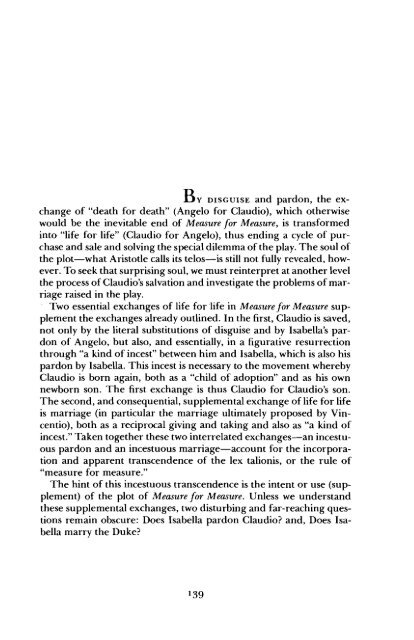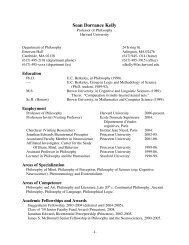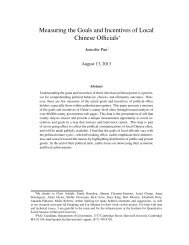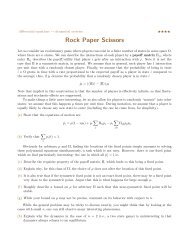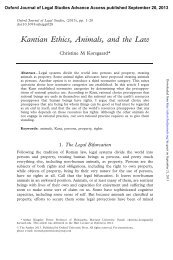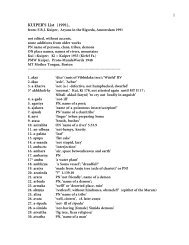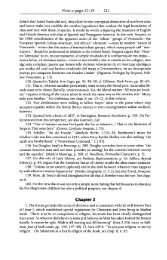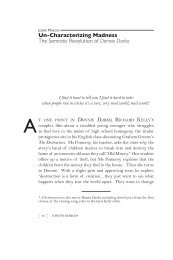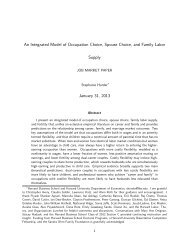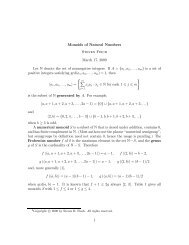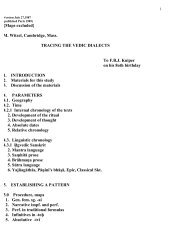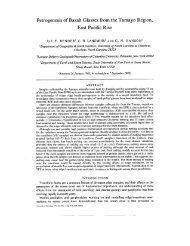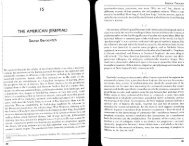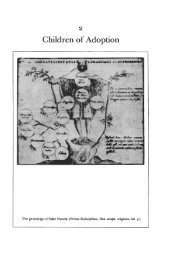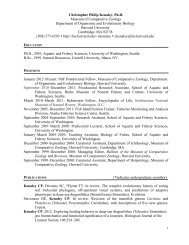Incest in Pardon and Marriage - People Fas Harvard
Incest in Pardon and Marriage - People Fas Harvard
Incest in Pardon and Marriage - People Fas Harvard
You also want an ePaper? Increase the reach of your titles
YUMPU automatically turns print PDFs into web optimized ePapers that Google loves.
BY DISGUISE <strong>and</strong> pardon, the ex-<br />
change of "death for death" (Angelo for Claudio), which otherwise<br />
would be the <strong>in</strong>evitable end of Measure for Measure, is transformed<br />
<strong>in</strong>to "life for life" (Claudio for Angelo), thus end<strong>in</strong>g a cycle of pur-<br />
chase <strong>and</strong> sale <strong>and</strong> solv<strong>in</strong>g the special dilemma of the play. The soul of<br />
the plot-what Aristotle calls its telos-is still not fully revealed, how-<br />
ever. To seek that surpris<strong>in</strong>g soul, we must re<strong>in</strong>terpret at another level<br />
the process of Claudio's salvation <strong>and</strong> <strong>in</strong>vestigate the problems of mar-<br />
riage raised <strong>in</strong> the play.<br />
Two essential exchanges of life for life <strong>in</strong> Measure for Measure sup-<br />
plement the exchanges already outl<strong>in</strong>ed. In the first, Claudio is saved,<br />
not only by the literal substitutions of disguise <strong>and</strong> by Isabella's par-<br />
don of Angelo, but also, <strong>and</strong> essentially, <strong>in</strong> a figurative resurrection<br />
through "a k<strong>in</strong>d of <strong>in</strong>cest" between him <strong>and</strong> Isabella, which is also his<br />
pardon by Isabella. This <strong>in</strong>cest is necessary to the movement whereby<br />
Claudio is born aga<strong>in</strong>, both as a "child of adoption" <strong>and</strong> as his own<br />
newborn son. The first exchange is thus Claudio for Claudio's son.<br />
The second, <strong>and</strong> consequential, supplemental exchange of life for life<br />
is marriage (<strong>in</strong> particular the marriage ultimately proposed by V<strong>in</strong>-<br />
centio), both as a reciprocal giv<strong>in</strong>g <strong>and</strong> tak<strong>in</strong>g <strong>and</strong> also as "a k<strong>in</strong>d of<br />
<strong>in</strong>cest." Taken together these two <strong>in</strong>terrelated exchanges-an <strong>in</strong>cestu-<br />
ous pardon <strong>and</strong> an <strong>in</strong>cestuous marriage-account for the <strong>in</strong>corpora-<br />
tion <strong>and</strong> apparent transcendence of the lex talionis, or the rule of<br />
"measure for measure."<br />
The h<strong>in</strong>t of this <strong>in</strong>cestuous transcendence is the <strong>in</strong>tent or use (sup-<br />
plement) of the plot of Measure for Measure. Unless we underst<strong>and</strong><br />
these supplemental exchanges, two disturb<strong>in</strong>g <strong>and</strong> far-reach<strong>in</strong>g ques-<br />
tions rema<strong>in</strong> obscure: Does Isabella pardon Claudio? <strong>and</strong>, Does Isa-<br />
bella marry the Duke?


